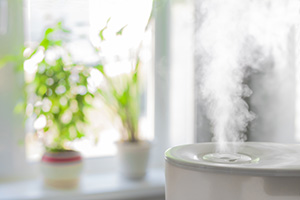Although alarming to experience, nosebleeds are rarely serious. Most nosebleeds are anterior nosebleeds, which happen when the nose’s inner blood vessels burst. These blood vessels are, unfortunately, very delicate and prone to breakage. However, this type of nosebleed is easily treated at home.
Anterior nosebleeds are often caused by chronic dryness inside the nostrils. This dryness could be the result of living in a dry climate, harsh winter weather or using certain medications. Other potential causes are excessive nose blowing, allergic reactions, foreign bodies, substance abuse, blood clotting disorders, and certain cancers.
You should seek medical attention if your nosebleeds last longer than 20 minutes, impedes normal breathing, or your nose begins bleeding after an injury. These symptoms could indicate a posterior nosebleed. Posterior nosebleeds happen when a bleeding occurs at the nose’s deepest part. They can be extremely dangerous! If you suspect a posterior nosebleed, visit the hospital right away.
Home Remedies
Once an anterior nosebleed has started, there are several methods for slowing it down. These home remedies all use easy-to-find supplies that you probably already have at home.
Here are our top treatments for stopping a nosebleed:
- Pinch: The pinch cure is a tried-and-true classic. While sitting straight, bend your head forwards a little, then pinch the soft area below your nose’s bridge. Keep the pressure there for 5 to 10 minutes and the bleeding should stop on its own. Do not lie down, tilt your head backward, or bend too far forwards.
- Cold Compress: Cold temperatures slow blood flow and constrict broken blood vessels. So, take an ice pack and wrap it in a dish towel. Tilt your head back slightly, while seated in a chair, and hold the cold compress to your nose’s bridge for 5 to 10 minutes. At this point, the bleeding should cease.
- Saline Water: Saline water is more of a preventative measure, although it is effective for gently cleaning the nostrils after an anterior nosebleed. You can make the saline solution at home or purchase nose spray at the pharmacy. If you opt to mix it yourself, stir 1/4 tsp of salt to 1/2 cup of lukewarm water. Add this solution to your nose with a dropper or a neti pot. This technique will moisturize your nasal passages and combat dryness.
- Apple Cider Vinegar: Apple cider vinegar (ACV) is known for sealing broken blood vessels quickly, thus preventing unnecessary blood loss. Take a cotton ball and soak it in ACV, before sliding it into the affected nostril. Keep the soaked cotton ball there for 10 minutes, after which point the bleeding should stop.

There are also steps you can take to prevent chronic anterior nosebleeds. For instance, you should invest in a humidifier to keep your home’s air moist. Moisturize your nostrils before bed with petroleum jelly. Try to avoid medications that commonly induce nosebleeds, including aspirin, antihistamines, and decongestants. Finally, never scratch the inside of your nose!
Diagnosing Chronic Nosebleeds
If you experience chronic, severe nosebleeds or suspect that your nose has sustained an injury, it’s time to contact a doctor. Medical professionals can perform full examinations of the affected area, check for foreign bodies, and refer you to specialized tests if needed. When you arrive at your appointment, try to give the doctors as much information as possible.
When doctors can’t pinpoint the cause, they will send you for a diagnostic test. Often, patients will need more than one of these tests to determine the full state of your nasal health. These diagnostic tests can include a nasal endoscopy, a complete blood count, a timing of blood clotting, and a CT scan or an X-ray of the nasal area.
Overall, remember to always prioritize your safety. Never leave a nosebleed untreated if you experience alarming symptoms, such as a large quantity of blood or a longer bleeding time. As we stated before, you could be experiencing a posterior nosebleed, which requires immediate hospitalization and surgery to repair.
See also:









